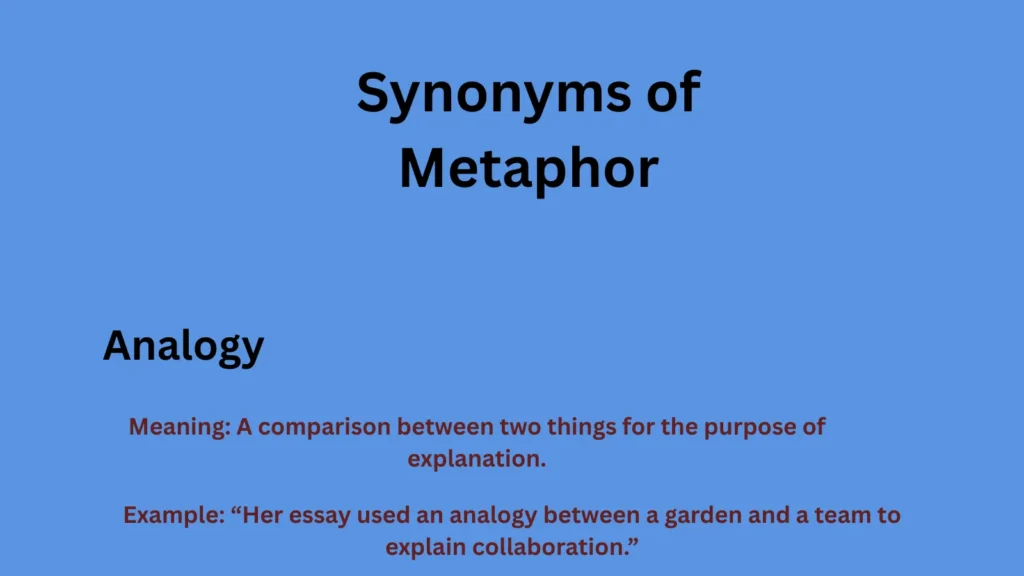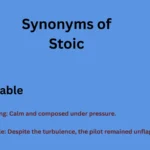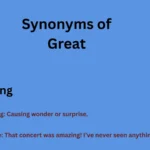Metaphors are the heartbeat of expressive language—used to illuminate ideas, stir emotions, and paint vivid pictures with words. But what if you’re writing something creative, analytical, or academic and you want a fresh way to describe metaphorical language? That’s where synonyms of metaphor come in.
This article explores 30 alternatives to metaphor, providing definitions, examples, and guidance on when to use each one.
If you’re a writer, student, or just someone trying to spice up your vocabulary, this guide will help you navigate the subtle nuances of each synonym.
What Does Metaphor Mean?
A metaphor is a figure of speech in which a word or phrase is applied to something it doesn’t belong to, suggesting a resemblance. For example, “Time is a thief” doesn’t mean time actually steals, but that it takes things away from us. Metaphors go beyond literal meaning to reveal deeper truths, emotions, and concepts.
30 Synonyms of Metaphor (And When to Use Them)
Here are 30 words and phrases that can be used in place of metaphor, with explanations and examples for each:
1. Analogy
- Meaning: A comparison between two things for explanation.
- When to Use: Ideal in essays or academic writing.
- Example: “Her essay used an analogy between a garden and a team to explain collaboration.”
2. Simile
- Meaning: A direct comparison using “like” or “as.”
- When to Use: Great for literary or poetic settings.
- Example: “He was as brave as a lion—that simile stayed with readers.”
3. Figure of Speech
- Meaning: Any non-literal use of language, including metaphors, similes, and idioms.
- When to Use: Best when speaking generally about rhetorical devices.
- Example: “The novel is rich in figures of speech that give it color.”
4. Allegory
- Meaning: A story or narrative with symbolic meaning.
- When to Use: Ideal for long, symbolic comparisons.
- Example: “Animal Farm is an allegory for political revolution.”
5. Symbol
- Meaning: A word or object that stands for something else.
- When to Use: When the comparison is visual or thematic.
- Example: “The broken clock in the play was a symbol of lost time.”
6. Imagery
- Meaning: Descriptive language that appeals to the senses.
- When to Use: In literature or poetry for mood and tone.
- Example: “Her imagery made the metaphor even more compelling.”
7. Allusion
- Meaning: An indirect reference to another work or concept.
- When to Use: In cultural or literary writing.
- Example: “His speech contained an allusion to Shakespeare.”
8. Comparison
- Meaning: The act of evaluating similarities between two things.
- When to Use: In casual or explanatory writing.
- Example: “The comparison between childhood and spring was subtle but beautiful.”
9. Parable
- Meaning: A simple story used to illustrate a moral.
- When to Use: For lessons in religious or philosophical contexts.
- Example: “The teacher used a parable to explain generosity.”
10. Allegorical Device
- Meaning: An object or character representing abstract ideas.
- When to Use: In literary or narrative analysis.
- Example: “The serpent was an allegorical device for temptation.”
11. Trope
- Meaning: A figurative or metaphorical use of a word.
- When to Use: In literary or critical theory.
- Example: “It’s a classic trope in romantic comedies.”
12. Conceit
- Meaning: An extended or elaborate metaphor.
- When to Use: When describing complex metaphors in poetry.
- Example: “The conceit comparing love to a compass was impressive.”
13. Hyperbole
- Meaning: Deliberate exaggeration for effect.
- When to Use: In dramatic or humorous writing.
- Example: “Her claim that she’d ‘died of embarrassment’ was hyperbole.”
14. Euphemism
- Meaning: A softer expression for something harsh or unpleasant.
- When to Use: In sensitive discussions.
- Example: “He passed away” is a euphemism for “died.”
15. Idiom
- Meaning: A culturally specific expression not meant to be taken literally.
- When to Use: In casual or regional dialogue.
- Example: “He spilled the beans” is a common idiom for revealing a secret.
16. Archetype
- Meaning: A typical example of a person or thing.
- When to Use: In psychology or mythology.
- Example: “The hero’s journey is an archetype in storytelling.”
17. Motif
- Meaning: A recurring symbol or idea.
- When to Use: In literary analysis.
- Example: “The use of mirrors was a recurring motif.”
18. Metonymy
- Meaning: Substituting a related term for something.
- When to Use: In stylized or formal language.
- Example: “The crown” as a metonymy for royalty.
19. Synecdoche
- Meaning: Using a part to represent the whole.
- When to Use: In poetic or rhetorical contexts.
- Example: “All hands on deck” is synecdoche for people.
20. Emblem
- Meaning: A visual object representing a concept.
- When to Use: In art or ceremonial contexts.
- Example: “The eagle is an emblem of power.”
21. Analogue
- Meaning: A thing seen as similar to another.
- When to Use: In technical or scientific comparisons.
- Example: “Sound waves are an analogue for water ripples.”
22. Expression
- Meaning: A phrase conveying an idea non-literally.
- When to Use: In everyday communication.
- Example: “She wore her heart on her sleeve—an expression of vulnerability.”
23. Dramatic Device
- Meaning: Techniques used to convey meaning in drama.
- When to Use: In theater or performance analysis.
- Example: “Foreshadowing is a powerful dramatic device.”
24. Visual Metaphor
- Meaning: Using imagery to represent abstract ideas.
- When to Use: In film, design, or visual arts.
- Example: “The cracked mirror was a visual metaphor for identity loss.”
25. Literary Device
- Meaning: A technique writers use to express ideas.
- When to Use: In literature or rhetorical analysis.
- Example: “Irony and metaphor are common literary devices.”
26. Rhetorical Device
- Meaning: A persuasive language technique.
- When to Use: In speeches or argumentative writing.
- Example: “Using rhetorical devices can elevate any speech.”
27. Imagistic Language
- Meaning: Language that appeals to the senses.
- When to Use: In poetry or lyrical writing.
- Example: “His imagistic language brought the scene to life.”
28. Double Meaning
- Meaning: A word or phrase with two interpretations.
- When to Use: In puns or layered meanings.
- Example: “The phrase had a clever double meaning.”
29. Symbolic Phrase
- Meaning: A phrase representing a broader idea.
- When to Use: In philosophical or poetic contexts.
- Example: “The road not taken is a symbolic phrase about choices.”
30. Turn of Phrase
- Meaning: A uniquely creative or clever way to say something.
- When to Use: To highlight stylistic flair.
- Example: “Her turn of phrase made the metaphor memorable.”
How to Choose the Right Synonym
When selecting a synonym for metaphor, keep in mind:
- Tone: Is your tone poetic, academic, casual, or persuasive?
- Context: Are you writing a blog, speech, poem, or story?
- Depth of Comparison: Do you need a simple visual (symbol) or a layered story (allegory)?
- Audience: Are your readers familiar with literary devices or general phrases?
For instance:
- Use a simile or an idiom in creative writing.
- Use analogy or comparison in essays.
- Use allegory or symbol in philosophical or artistic work.
Final Thoughts
Understanding the synonyms of metaphor, such as analogy, simile, allegory, and symbol, opens up new ways to express complex ideas with creativity and clarity.
Each synonym carries its own nuance, helping you adapt your language to suit different contexts, from poetic writing to persuasive communication. By using these alternatives thoughtfully, you can add richness, depth, and vivid imagery to your expression.
Whether you’re a student, writer, or language enthusiast, mastering these words will enhance both your understanding and your use of figurative language.

I am Awa White, a passionate writer who loves crafting stories that touch hearts. I explore emotions and everyday life through my words. I strive to inspire and connect with readers through every piece I write.


